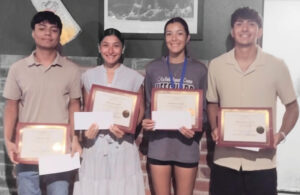- Scholarship Awards
- La Feria ISD is Set to Get Its Own Police Department
- All-Star Regionals
- LFECHS Non-Varsity Band Represents at State
- School Program Continues to Provide Fun Summer Activities
- Conservation Group Wildlife in Focus Expands Unique Photography Contest to Reach More Landowners, Photographers Statewide
- Local Birding Center Offers a Variety of Events
- Valley Native is Heading to the Olympics
- Hurricane Preparedness For Families
- Golf Tournament to be Held toHelp Cancer Patients
Preparing Texas workforce for post-pandemic careers
- Updated: November 5, 2020

By ROZ BROWN
Texas News Service
AUSTIN, Texas — For the almost one million Texans unemployed, the post-coronavirus landscape is likely to look vastly different for work and school.
The pandemic has shown people who can work remotely are less likely to lose their jobs, and tend to have higher education levels.
Jamie Merisotis, president and CEO of the Lumina Foundation, a nonprofit organization focused on learning beyond high school, said one lesson from the pandemic is many areas of society will need to adapt to offer people more opportunities.
“COVID has revealed many weaknesses in the system, both weaknesses in the education system and weaknesses in the system of work,” Merisotis contended. “I don’t think the ‘old normal’ is what we want to go back to. We want a ‘new normal,’ because what we know is that people need new skills.”
Merisotis wrote a new book, “Human Work in the Age of Smart Machines.” He makes the case for rethinking higher education and job training to sustain the future U.S. workforce in an age of robotics and other technologies, and said schools and employers that adapt can profit from the changes.
The shift to remote learning this year has led some educators to champion more tools powered by artificial intelligence.
Peter Stone, professor of computer science at the University of Texas at Austin and co-author of the 2016 report, “Artificial Intelligence and Life in 2030,” also anticipates post-pandemic changes for society.
“Because of the demand right now, there’s a lot of learning happening in the community about what are the best practices, what works better online, what works better in person,” Stone explained. “I wouldn’t be surprised if at the end of this, that we don’t snap back to the way things were, but rather have a more hybrid approach.”
Stone said there’s already an increased focus on experiential learning, moving away from instructors delivering lectures to large audiences and instead, presenting opportunities to learn by trying and doing.


